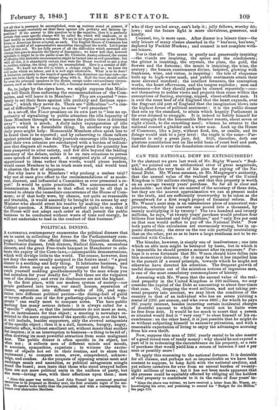POLITICAL DINING.
A SATIRICAL contemporary enumerates the political dinners that are to assist in collecting the forces for the Parliamentary cam- paign ; including the official dinners, the Opposition dinners, Protectionist dinners, Irish dinners, Radical dinners, anomalous dinners, and the great Free-trade banquet in Manchester to cele- brate the expiry of the Corn-laws,—incompatible demonstrations, Which will divulge little to the world. The censor, however, does not deny the merit usually assigned to the festive meal : " a good dinner is a soothing and holy thing. It lubricates business, and smooths down many an asperity of temper and feeling. You catch yourself nodding goodhumouredly to the man whom you had mistaken for your deadly foe." But these are the vulgarest uses of the dinner; and even its disclosures are not the highest.
In the first place, with our modern system of society—our People gathered into towns, our small houses, separation of classes, separation into different walks of life, and sepa- ration into different political parties—the dining-hall of guild or tavern affords one of the few gathering-places at which " the people " can really meet to compare notes. The bare public meeting has many serious defects : it is always called for a
specific " object, so that the interlocutors do not meet as men, but as instruments for that object ; a meeting is nowadays re- stricted to the mere supporters of the specific object, or at the best, it will include, besides supporters, only the avowed antagonists of the specific object ; then it is a dull, inornate, hungry, angry, inartistic affair, without emollient art, without music that soothes but inspires; it is an interruption to business—a thing to be rid of ; often deriving its most powerful attraction from some malignant beat. The public dinner is often specific in its object, but often not ; it collects men of different minds and moods, to associate, sympathize, expatiate ; to witness the excite- ment of objects not set in their routine, and to share that excitement ; to compare notes, avow, comprehend, acknow- ledge, and confess. As the picquets of opposing armies meet and exchange meals and amenities, so political antagonists mingle round the board; men learn that those who stood arrayed before them are not mere political units in the uniform of party, but also men—loving men, with their affections upon them ; men • Since this paper was written, Lord John Russell has announced practical tleOlUtiOnS to be proposed on Monday next, the first available night of the ses- 4013. He speaks more boldly than the journalist, and with a corresponding in- Max over obstructive Members.
who if they are led away, can't help it ; jolly fellows, worthy fel- lows : and the future fight is more chivalrous, generous, and kindly.
Counsel, too, is more open. After dinner is a leisure time—the only leisure of many classes absorbed in the " bus'ness, bus'ness," deplored by Puckler Muskau ; and counsel is not complete with- out leisure.
Nor is that all. The scene is gently and generously inspiring —the viands are inspiring, the spices and the condiments; the glitter is inspiring, the crystals, the plate, the gold, the flowers and the festoons; the music is inspiring, the wine, the oratory ; the human countenance divine, inspired, glowing with frankness, wine, and virtue, is inspiring : the tide of eloquence boils up to high-water mark, and public sentiments attain their most elevated standard ; the intellect ferments, the conception works, the heart effervesces, and the tongue explodes ; men and statesmen—for they should perhaps be classed separately—com- mit themselves to nobler views and projects than come within the conceptions of fasting, starving, nipped, closet-stiffened men. It is over the roast beef of old England that the heart expands, over the fragrant old port of England that the imagination blows into the highest forms of political sentiment : it is the public dinner that sets up the standard, to attain which happily Parliament is for ever doomed to struggle. It is indeed to fortify himself for that struggle that the honourable Member resorts, about seven or eight o'clock, to the ennobling meal ; whence he returns to the national counsel a gladder and a wiser man. Lock up the House of Commons, like a jury, without food, fire, or candle, and its doings would sink to a jury level : the staple is the same—Par- liament is only a great jury, fed. Still, therefore, doth our glorious constitution rest on the solid basis of roast beef and port, and the dinner is ever the foundation-stone of our institutions.


























 Previous page
Previous page